As this reporter biked along a dusty pothole-ridden road, clouds of dust billowed up around him, coating his once-groomed hair and clothes with gritty dust, mirroring the rugged terrain he traversed. This is Agbarigidoma-Oloje road in Ilorin-West which has been a source of worries for its over twelve connected communities due to its deplorable condition.
Every season, the road presents challenges, contending with recurrent flooding during the rainy months and becoming ensconced in layers of dust during dry periods.
The accident Abdullahi Ibrahim, 27, experienced on the road in 2019 left him with a memory that incessantly hurts his heart. He recounted that he was returning home late after a heavy downpour had deluged the thoroughfare of Agbarigidoma-Oloje road in July. Ibrahim’s motorcycle ditched into a drainage, leaving a grievous wound on his left leg.
“Whenever it rains, the road always floods. On that particular day when I had the accident, it was late at night, and I didn’t want to stay outside any longer. So, I struggled to ride down the flooded road, but the next thing I knew was, I found myself inside the drainage, and swept away by the water until I managed to grab onto something to stop myself. No one could hear my cries for help, so I continued to struggle to get home on my own. Unfortunately, the next day, I discovered that my bike was damaged beyond repair.
“My left leg bone was cracked too, that is why you see that it is bent if you look closely, Mr Ibrahim a resident of the community said, recounting the accident he had on Agbarigidoma-Oloje road.
Not only Ibrahim experienced an unfortunate incident on the Agbarigidoma-Oloje road, but other residents, including road users, also encountered similar tragic incidents. They expressed strong dissatisfaction regarding the hardship of traveling the road and their homes being frequently flooded during heavy rainfall.
Mustapha Naheemudeen, a youth in the community, often travels away from his home when the community road floods. He remarked that navigating through the route is difficult, especially during the rainy season.
“It is tough to navigate the road during the rainy season. If homes remain unaffected by the downpour, you will likely hear news of someone ditching their motorcycle into the bridge or drainage”, said Naheemudeen.
While Ibrahim’s accident was avoidable, the distress and unfortunate accidents on the Agbarigidoma-Oloje road would have been history if the road construction project allocated to the community had been completed with high quality.
In 2017, the ex-lawmaker, Bukola Saraki, representing Kwara Central Senatorial District, facilitated the ‘construction and rehabilitation’ of the Agbarigidoma-Oloje road to alleviate the plight of the community and its neighborhoods.
Earmarked at N50 million, the Federal Ministry of Agriculture and Rural Development awarded the project to Ismade Integrated Nigeria Limited.
However, a visit to the project site revealed that what was delivered was ‘surface dressing’ of the road as against underlay asphalt if proper technical investigation was carried out, —as recommended by experts.
Initially, when the long-awaited prospect of a good motorable road arrived in the community, the hearts of its residents filled with joy as they hoped the long hardship on the road had finally come to an end. Little did they know, the joy would soon disappear, and the road would remain a source of hardship.
Poor execution causing more frustrations
For Agbarigidoma-Oloje road, which spans 4km through Madina, a neighborhood community, the project was designed to cover the area. However, it only covers 1km, with poor drainage system made of blocks, despite the region being prone to flooding.
According to the residents, they expressed that the project began in February 2018 and was completed in May. However, the road could only maintain its new smooth look for a few months, as it soon succumbed to the emergence of potholes shortly after the contractor’s departure from the site.
During a visit to the project in February, it became evident that inferior materials were utilized, resulting in the project’s deterioration. The drainage system provided was inadequate to channel water through, consequently resulting in frequent road inundation and terrible potholes lacing the road. These discrepancies have caused increasing frustration among residents and road users.
Aminat Isiaq, 38, a food seller in the area, expressed sadness that the project has failed to alleviate their enduring struggle with the road. She added that the poor construction of the project has further worsened the state of the road.
“The first rainfall that met the road after its completion revealed that the work was poor, because that rain swept some of the asphalt away. It would have been better if they had left it (the road) as it was before. The project has brought frustration to all the communities around here.
“There was a year we experienced a lot of rainfall. If you visit this road at that time, you won’t be able to pass.
Those bikemen you see at the junction there won’t work because it’s always difficult to maneuver through the road”, she said.
The plight of the residents mirrored what Abdulmajeed Mubarak often encountered during the rainy season. Mubaraq who owns a vulcanising shop in the community said the deplorable condition of the road has drastically affected patronage by his customers. He said, before the project, he received an average of 20 customers, but the current state of the road has reduced patronage to about 10 daily.
Often during the heavy downpour Mubarak finds his shop submerged in water, he waits hours for the water to recede before continuing with his trade. Other shop owners do as he does before resuming their day’s businesses.
“You’ll be more worried if you had visited this road during the rainy season. I’ve been working in this community for years but the condition of the road has affected the patronage I often get. The project worsens it because my customers always complain about the road”, Mr Mubarak said.
Community leader laments
The community chairman, Ibrahim Ajikobi, said that the road had long been maintained by petty contributions from community members. He lamented the relentless plight endured by the community due to the dilapidated condition of the road, which as well frustrates the activities of the sprawling communities.
He further added that the shabby execution of the project has eroded their initial joy of when the project first arrived in the community.
“When they approached us, saying that they would be doing surface dressing for us, we argued with them, knowing that surface dressing wouldn’t work for us due to our terrain being water lodge. We suggested they should have conducted a diligent technical investigation of the area.
However, we gave up when they insisted that was what was awarded to them”, Mr Ajikobi stated.
He further stated that when they observed disparities like distance covered, poor drainage, as well as poor execution, they expressed their resentment, but the contractor presented them the paperwork which stands to be true that the scope of the project would be surface dressing covering 1 kilometer against the initial 4km they were earlier informed.
“The first signboard they erected captioned it would cover 4km, but they didn’t do it up to 1km, when we pressured them, they then extended it to make a kilometer.
If we had known this is what the project would turn to, we wouldn’t have accepted it. The project worsened the state of the road, it would have been better if they left it in its old deplorable state.
“They didn’t even do proper drainage for us, the vast piece of the drainage you see was community’s efforts. Just a few parts the contractor did were made of blocks.” He added.
Speaking further on the community’s efforts to alleviate the hardship on the road, he said the community had expended over N600,000 in maintaining the road. He revealed that quarterly, they put up funds to grade the road to be motorable, but since the project, they had stopped grading the road in fear of being sanctioned for destroying government’s property.
“We most times exhaust community’s funds on the road. We recently bought pilled asphalt to fill up the potholes. We pleaded to the facilitator of the project and the ministry but nothing was done.” Mr Ajikobi added
Another shabbily road project
For a long time, Ero-Omo Kilanko road in Ilorin South Local Government Area, has been plagued with dreadful occurrence such as accidents and flooding. The road, widespread with potholes that have become gullies, has a history of being responsible for unfortunate incidents, and a source of frustration to the community.
According to the residents, they expressed that when there is heavy rainfall, the road becomes almost impassable, submerging the vast piece of the road.
Similar to the Agbarigidoma-Oloje road project, aimed at alleviating the community’s plight, Mr. Saraki also facilitated the construction and restoration of the Ero-Omo Kilanko 4.5 kilometers road in 2017.
Earmarked at N50 million, the project was awarded by the Federal Ministry of Agriculture to RKK Inspire Limited.
The residents were joyful when the contractor moved in equipment and machinery to commence work on the road.
After its completion, they bid the contractor farewell in appreciation of his work done, but in a complete twist of fate, the road became a death trap and remains a source of frustration.
It has fallen into a severe state of disrepair due to poor construction, and now experienced a cut off amid the roadway which has totally forbidden residents from plying the road with motorcycles. The gullies have become wide affecting various homes.
“You can also see the road, no car or even a bike can manage to ply it. Though it was deplorable before they came to do the project but the project they did that year (2017) worsened it more”, said Adam Musa, a resident of the community.
A journey through the road epitomises a trial of endurance, as almost all parts have been intensely eroded. For a project that was designed to be 4.5 kilometers, it was executed covering only 1 kilometer.
It is inconceivable that the road benefitted from any kind of construction in 2017.
Owning to the bad state of the road, many businesses have closed, accompanied by the toll of lives lost and the specter of harrowing accidents.
Before the government intervened to reconstruct the road, the community helped in rehabilitating the road to make it passable, although they still make efforts to maintain some sections to prevent the road from total decay.
Residents complain bitterly that their houses are often flooded during heavy downpour, and some of the road sections have deteriorated to the point where they are impassable for motorcycles.
Muinah Sulyman expressed that the road has affected the community’s development as many residents have considered leaving the area. She added that poor construction was responsible for the road being worsened.
“Poor drainage was the most thing that prompted the deterioration of the road. Surface dressing can’t survive in a water logged area like this community.”
A community elder, Abdullahi Jiddah, stated that despite the road serving as a link of connectivity to the major roads, the project that ought to face lift it worsened it. He added that the contractor only provided one-side drainage, which was responsible for the fast deterioration of the road.
“I’ve not seen any good road they’ll construct without two-side drainage. There’s one gully there, they didn’t do it well, now it has caused the road to be impassable. We have big problem when it comes to road.
“When we argued with them about the job and that we’re not pleased with them, they told us that is what they asked them to do”, Mr Jiddah said.
Also, Alhaji Sadiku, the community’s Secretary, stated that efforts were often made to make the road passable before the project but they couldn’t do that any longer because of the severe deterioration.
“We often contribute money to rehabilitate the road, we later reached the conclusion that everyone should be working on the road that leads to their home.
“We’ve tried to patch the road many times, but once the rain falls, it’ll wash them away, to continue rehabilitating the road is beyond our ability”, Mr Sadiku expressed.
Speaking on the efforts made after the road failed following the completion of the project, he stated that when they visited the supervising Ministry’s office in Kwara State to lay their complaint, they didn’t respond to them.
“Other parts they didn’t do are even better than the one they did. No way the project has alleviated our suffering, it only made it worse because now the road is no longer in use because it’s impassable due to its condition”, he added.
Reacting to the FOI letter by Elites Network for Sustainable Development, (ENETSUD), a Kwara’s Civil Society Organisation, the Federal Ministry of Agriculture and Rural Development in Kwara State commented that both projects were completed, but failed to give account on the amount released.
“Please note that the contractual sum of the aforementioned projects can be requested from the office of the Accountant General of the Federation and Federal Ministry of Agriculture and Rural Development, Abuja”, the ministry said in response.
However, the subsequent response by the Federal Ministry of Agriculture and Rural Development, Abuja didn’t provide the Bill of Engineering Measurement and Evaluation (BEME).
Lanre Osho, the ENetSuD’s deputy coordinator, he expressed disappointment over the poor execution of the project, adding, that the Ministry’s failure to provide the Bill of Quantity was a way of avoiding being held accountable.
“Even the ministry knew the projects were poorly constructed, because when we visited the sites we observed that the projects had been dilapidated. Imagine a project of 2017 laying in such situation.
Mr Osho stated that the lack of provision of Bill of Quantity by the Ministry hindered the group to undertake the evaluation of the work done on the both sides.
“It is difficult to carry out the technical evaluation when we don’t have the Bill of Quantity. If we were able to get it, would ascertain what and what was supposed to be done”, he said.
He also lament that the projects’ scope of surface dressing is the due to poor feasibility study of the area before embarking on the project.
“The communities are submerged with erosion, and there’s need to control the erosion. The first thing required, is to first construct drainage to control the erosion, and construct the road with underlay asphalt”. But this was not done, leaving the communities in a worse condition that they were in before construction of the road.
By: Abubakar Abdulrasheed
This report is produced with support from the Wole Soyinka Centre for Investigative Journalism (WSCIJ), under the CMEDIA Project.

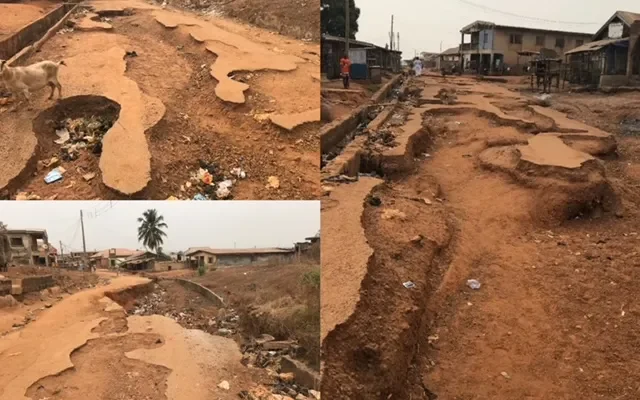

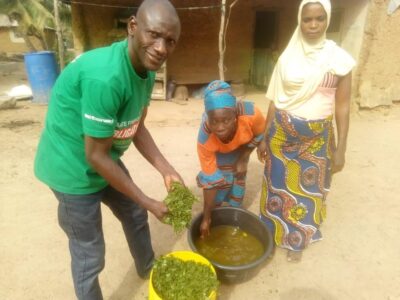

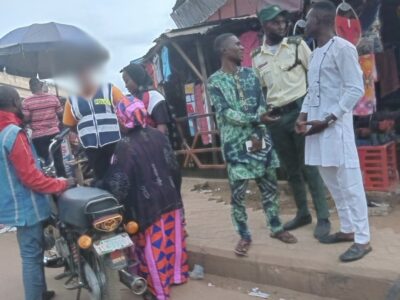
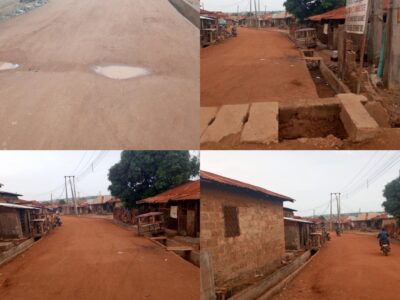

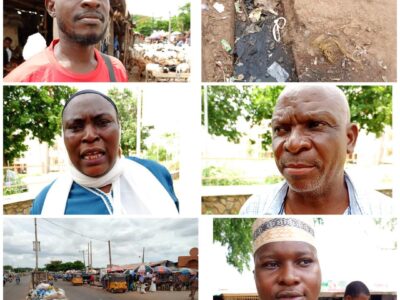

Comments